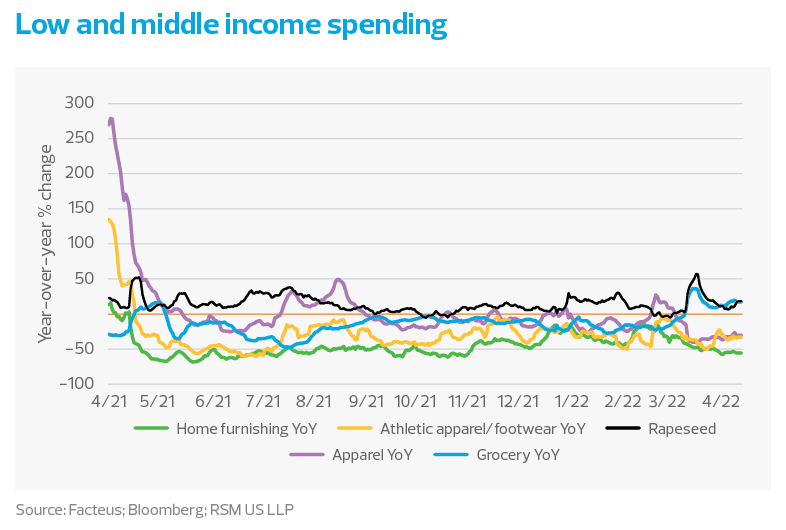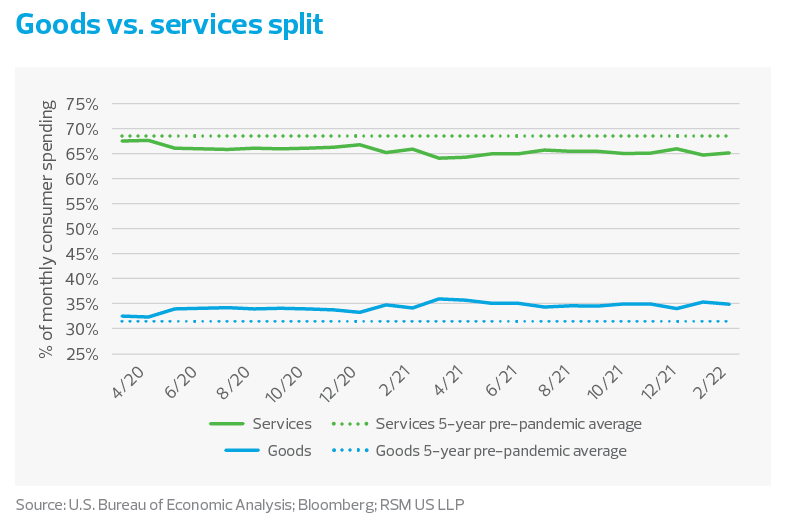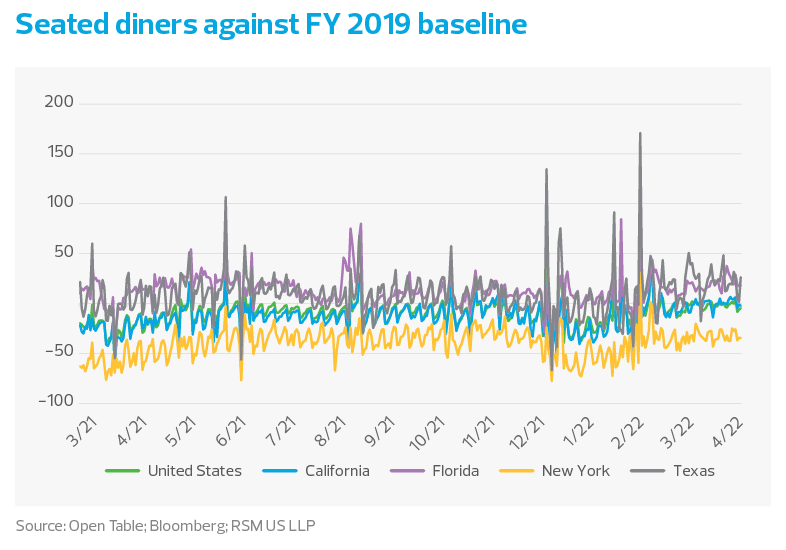Resources
The changing consumer: Tighter budgets and a shift to services
ARTICLE | May 03, 2022
Authored by RSM US LLP
As the economy reopened following the shock of the pandemic, the ensuing recovery has unleashed a surge in consumer buying power as wages have increased, government aid has landed in checking accounts and household savings have soared.
But as inflation continues to rise, reaching 8.5% in March, consumers are feeling a squeeze as they devote a larger percentage of their monthly budgets to meeting fixed costs like groceries, rent and energy.
Now, as the Federal Reserve raises interest rates and Congress reins in spending, middle market businesses are dealing with a new question: Are consumers still wielding that strong buying power to purchase goods, or has sentiment shifted?
What’s clear is that consumer goods companies need to adjust to a rapidly changing landscape where household budgets are tighter and consumers spend on services as the economy continues to reopen.

The impact of price increases
While consumers had largely overlooked price increases throughout the recovery, that has changed in recent months, particularly among lower-tiered earners.
Since March, low- and middle-income wage earners increased their spending on essential items like groceries and gas by an average of 12% and 17%, respectively, on a year-over-year basis, according to Facteus, an alternative data research company. Over the same period, purchases of less essential items like apparel and home furnishings declined by more than 25% each. While a portion of this decline is attributed to government stimulus, the increase in grocery and gas is notable.
In April, consumers continued to pull back on many nonessential purchases, including the decline in demand for nearly all nonedible categories, according to recent spending data provided through the IRI CPG Demand Index. In the most recent University of Michigan consumer sentiment readings, consumers indicated that they are less confident in their ability to absorb additional price increases; 40% view this as a bad time to make large household durable purchases.
Even with disposable income dollars above pre-pandemic levels, real disposable income has declined as inflation has eaten into discretionary dollars. Retail sales excluding food service, gas, building materials and motor vehicles declined each of the last two months, the first time this occurred since April and May 2021, according to U. S. Census Bureau data.
As these pricing pressures continue, consumers will most likely shift some buying preferences to more necessary and shelf-stable items, like frozen foods, pasta and private-label goods, to operate within established home budgets rather than spending on desirable goods.
As a result, consumer goods companies will need to rethink sales strategies to ensure they are providing value consumers are willing to spend on as a decline in sales volumes pressures companies to protect margins.

Another factor expected to affect consumers’ spending is the anticipated transition of spending on services like travel, dining out and events.
Since the start of the pandemic, goods purchases have accounted for on average 34% of wallet share, compared with the five-year pre-pandemic average of 31%.
Similarly, spending on services has accounted for on average 66% of consumer wallet share, down from the 69% five-year pre-pandemic average.
As states relax COVID-19 restrictions and the summer approaches, we expect to see consumer dollars shift from goods to services. In the latest consumer spending data available, service volumes had returned to pre-pandemic levels; however, goods purchases were still elevated from historical norms.
Service spending will vary by region, as evidenced by mobility data provided by Open Table. In March, the average number of seated diners across the United States was approximately 95% of 2019 levels. When this data is viewed at a state level, though, the averages vary. For instance, in Florida, seated diners averaged 115% of 2019 levels, while in New York, the average was 65% of 2019.

The takeaway
In the coming months, consumer goods companies will need to continue to evaluate what consumers are willing to spend on as budgets tighten in today’s inflationary environment.
Companies cannot operate as if last year represented a return to normal. We expect much of the spending that drove the strong financial performance of consumer goods companies to shift toward other areas like services this year and beyond.
As a result, consumer goods companies should ensure they are strategically positioned to take advantage of consumer spending habits and be nimble to protect margins.
Let's Talk!
Call us at (325) 677-6251 or fill out the form below and we'll contact you to discuss your specific situation.
This article was written by Mike Graziano and originally appeared on May 03, 2022.
2022 RSM US LLP. All rights reserved.
https://rsmus.com/insights/industries/consumer-goods/tighter-budgets-and-a-shift-to-services.html
RSM US Alliance provides its members with access to resources of RSM US LLP. RSM US Alliance member firms are separate and independent businesses and legal entities that are responsible for their own acts and omissions, and each is separate and independent from RSM US LLP. RSM US LLP is the U.S. member firm of RSM International, a global network of independent audit, tax, and consulting firms. Members of RSM US Alliance have access to RSM International resources through RSM US LLP but are not member firms of RSM International. Visit rsmus.com/about us for more information regarding RSM US LLP and RSM International. The RSM logo is used under license by RSM US LLP. RSM US Alliance products and services are proprietary to RSM US LLP.

Condley and Company, LLP is a proud member of the RSM US Alliance, a premier affiliation of independent accounting and consulting firms in the United States. RSM US Alliance provides our firm with access to resources of RSM US LLP, the leading provider of audit, tax and consulting services focused on the middle market. RSM US LLP is a licensed CPA firm and the U.S. member of RSM International, a global network of independent audit, tax and consulting firms with more than 43,000 people in over 120 countries.
Our membership in RSM US Alliance has elevated our capabilities in the marketplace, helping to differentiate our firm from the competition while allowing us to maintain our independence and entrepreneurial culture. We have access to a valuable peer network of like-sized firms as well as a broad range of tools, expertise and technical resources.
For more information on how Condley and Company can assist you, please call (325) 677-6251.
